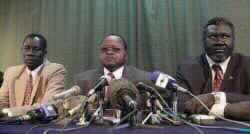HIGHLIGHTS: Two Sides Nearly Have Everything on the Table-Never Gone this far Before, Says IGAD Team, Mediating the Peace Talks||Talks Broke for Circumstances Beyond Negotiating Table||Mediators Confident Talks Would Resume Even if Fighting on the Ground Continues||Rebels Say Government Looking for Pretext to Leave Talks Because it Feels it Gave Too Much at the Machakos Protocols|| STORY: Mediators trying to end Sudan's 19 year civil war say they are confident that peace in Sudan is still achievable, despite the collapse of negotiations on Monday.
''We've gone through nearly most of the issues so I don't see a reason why I can't be very confident -- 75 percent confident,'' says General Lazaro Sumbeiywo, head of the regional Inter-Governmental Authority on Development (IGAD) team which is mediating the Sudanese peace talks. ''We have nearly everything on the table. They have never gone this far before in any negotiations so that's why I'm very optimistic,'' he says.
Sumbeiywo says the talks broke down because of ''circumstances beyond the negotiating table''. On Monday, Sudanese President Omar el Bashir ordered the government negotiating team to leave the peace talks following the rebels' capture of the strategic town of Torit the previous day.
The rebels claim that it is the government that went on the offensive and insist that they were only responding to government provocation when it captured Torit on Sunday.
''They told us, look, there is no cease-fire. As long as there is no cease-fire, we are going to fight,'' says SPLA spokesperson Samson Kwaje.
''So they actually justified that going on an offensive will not necessarily affect the peace talks. Now when we have responded, they withdraw from the peace talks,'' he says. The SPLA says a cease-fire cannot be discussed until all other issues are settled. The two sides were due to start cease-fire negotiations this coming Saturday.
Nonetheless, the mediators are confident that the talks will resume, even if fighting continues on the ground.
''The current break in the talks does not signal an end to the Sudan peace process under the IGAD initiative. Both the government of Sudan and the SPLA have explicitly confirmed their commitment to the IGAD peace process and the Machakos Protocol of 20 July 2002,'' says Sumbeiywo. He says the government delegation told him Monday that ''they would see themselves coming back very soon''.
In the ground-breaking Machakos Protocol, the two sides agreed that southern Sudan will be exempted from Islamic Sharia (laws) and will be allowed to vote for independence after a six-year interim period.
On Tuesday, the government said that it had decided to recall its delegation from Machakos because the SPLA was backtracking on the commitments made in the July protocol.
The government says that the SPLA's demands at the second round of talks, which started three weeks ago, were unreasonable - namely asking for too much power via a confederal system of government, establishing a Sharia-free capital during the interim period and altering the borders of southern Sudan.
The SPLA counter that these were just proposals for negotiation. The SPLA charge that the government was looking for a pretext to walk out of the talks because it felt it had given too much away in the Machakos Protocol.
The SPLA believe that the government's real reason for terminating the talks was because Sudanese President el Bashir is under pressure from military hardliners not to make further concessions at the negotiating table.
Sumbeiywo says IGAD, in consultation with the parties, will set a date for resumption of talks in the near future. They are waiting for IGAD chairperson, Kenyan President Daniel arap Moi, to return from the World Summit on Sustainable Development in Johannesburg, South Africa.
Both the government and the rebels have appealed to the international community to pressurize the other side to resume negotiations in good faith.
PHOTO CAPTION
Leaders of the rebel Sudan People's Liberation Movement listen to questions at a news conference in Nairobi, Kenya, Tuesday, Sept. 3, 2002, after they announced their readiness to resume peace talks with the government of Sudan, which Khartoum broke off on Monday after the rebel army took control of Torit, an important town in southeastern Sudan. From left are Deng Alor, SPLM governor of Bahr al-Ghazal province, SPLM spokesman Samson Kwaje and Malik Agar, SPLM governor of Blue Nile province.(AP Photo/Khalil Senos
- Author:
& News Agencies - Section:
WORLD HEADLINES


 Home
Home Discover Islam
Discover Islam Quran Recitations
Quran Recitations Lectures
Lectures
 Fatwa
Fatwa Articles
Articles Fiqh
Fiqh E-Books
E-Books Boys & Girls
Boys & Girls  Women
Women










